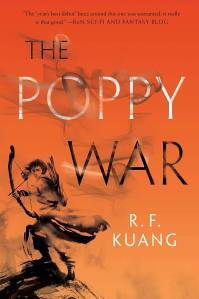The Poppy War, by R.F. Kuang

This book, the first of a trilogy, started so well that I was sure I was going to want to race through the whole trilogy as quickly as possible. Yet by the time I finished it, I had absolutely no desire to pick up the sequel. It’s not badly written at all, it’s just very definitively Not For Me. This is OK, I’ve realized. Not all books are for all readers.
The Poppy War, as the title might suggest, is a fantasy novel set in a world inspired by China — the events of the novel corresponding quite closely to late 19th-early 20th century China, though the setting in the book is pre-industrial and the weaponry medieval, as is typical for fantasy novels. A young orphaned girl, Rin, takes a desperate long shot at escaping her miserable life by taking the famously difficult entrance exam that will grant her admission to higher learning, even though she has no formal education. It’ll be no surprise to anyone who’s ever read a fantasy novel that Rin passes the exam, gains admission to an elite military academy, and finds herself a fish out of water among her wealthy, privileged classmates as she tries to harness her natural talents to become a warrior.
So far, so familiar — but not in a bad way. These are the tropes of much fantasy, and if well executed, the story of the kid from nowhere who turns out to have special gifts and carves out their place in the world can be an enjoyable journey. “Enjoyable” isn’t quite the word here, as one hardship after another befalls Rin in her education to the point that the novel began to remind me of Elizabeth Moon’s The Deed of Paksennarion, an epic fantasy novel I read in the years before I blogged about everything I read, in which the heroine joins a mercenary company and goes through so many trials and tribulations I got exhausted reading about them and never had the urge to re-read the novel (which is unusual for me).
However, the Chinese-inspired setting of The Poppy War was interesting and well-drawn, and Rin was an engaging character who I wanted to succeed, so I hung in there.
Then it got worse.
Then it got much, much worse.
Not only the amount of suffering our heroine has to endure, nor even the staggering amount of much-too-vividly described suffering she sees around her (it is set during a brutal war, after all), but the suffering she becomes willing to inflict, the evil she herself is willing to commit — all I can say is, it just got too dark for me. To the point where it felt unrelenting and gratuitous, and I had no hope that Rin would continue to be a character whose adventures I wanted to follow through two more books.
I’ve seen this book described as “grimdark” which is just the kind of cheeky BookTok-trope-inspired descriptor that I usually don’t use, but it is both very, very grim and very, very dark. And that is fine if that’s the kind of thing you like to read. I personally like my fantasy with lots of realistic darkness and drama, but also with an overarching sense that there is good in the world worth fighting for (thank you, Professor Tolkein, for pre-setting my expectations that way) and also that the story’s main character, while they may be deeply flawed and do bad things, is ultimately on the side of that good and will help to bring it about. Call me old-fashioned but those are the kind of fantasy novels I like.
Fortunately, there are lots of those kinds of books. And for people who prefer grimness, darkness, an overarching lack of hope, and an antihero you may not be able to cheer for … there is The Poppy War. And its two sequels, presumably … though I’ll never know for sure.



